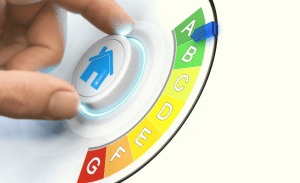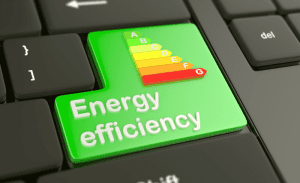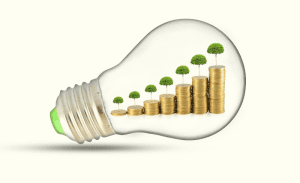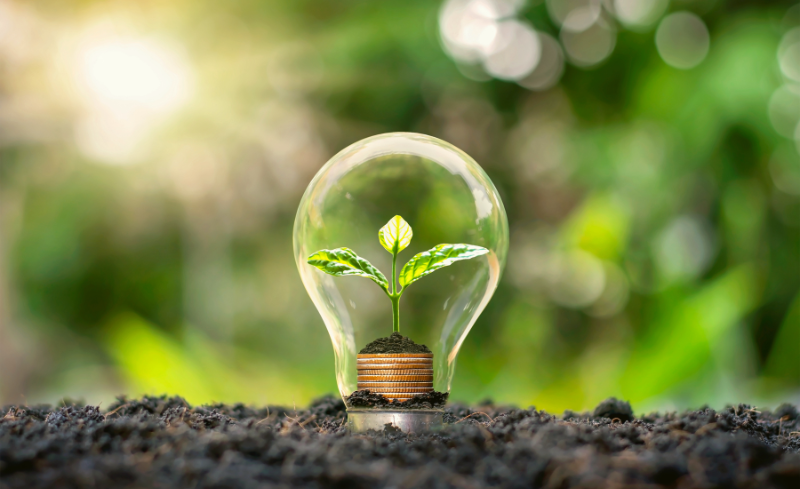October 21st is World Energy Saving Day, a date to remind us of the importance of being mindful of how we consume energy, both on a personal and business level. It is a great moment to reflect on the impact our actions have on the environment. By adopting small changes and promoting energy saving, we take care of the environment and reduce the environmental impact of energy use. In this article, we share the importance of energy efficiency and a series of best practices for more responsible energy consumption because sustainability is what sustains the planet and is the energy that drives us.
WORLD ENERGY SAVING DAY: FOR MORE EFFICIENT ENERGY CONSUMPTION
World Energy Saving Day, celebrated on October 21st, aims to invite society to reflect on the energy consumption we engage in daily. With small actions, we can make more efficient use of energy.
“The cleanest energy is the one that isn’t consumed” — Popular Proverb.
 Our society’s energy needs continue to grow, and to provide solutions without negatively impacting the environment, it is essential to find ways to reduce our consumption and adopt sustainable practices to minimize our carbon footprint, ensuring that efficiency and sustainability are present in everything we do.
Our society’s energy needs continue to grow, and to provide solutions without negatively impacting the environment, it is essential to find ways to reduce our consumption and adopt sustainable practices to minimize our carbon footprint, ensuring that efficiency and sustainability are present in everything we do.
Every day, we rely more on energy to carry out our daily activities. However, this resource is finite.
World Energy Saving Day invites us to reflect on how our actions can make a difference in conserving this vital resource.
Every small change we make, whether at home or in our business, adds up, counts, brings value, and makes a difference.
At TMA, as a waste management company, we promote energy savings in all processes related to waste management.
BEST PRACTICES FOR REDUCING THE IMPACT OF ENERGY CONSUMPTION
What impact does our energy consumption have? The concept of “energy footprint” measures the amount of energy we consume and its impact on the environment. Every electrical device we use, every light bulb turned on, and every kilometer traveled in transportation has an energy cost that, when added up, contributes to global warming.
Changing small habits can have a big impact. From replacing traditional light bulbs with LEDs to unplugging devices we’re not using, energy saving is within everyone’s reach.
 Here are some best practices we can all implement for more efficient energy consumption with less environmental impact:
Here are some best practices we can all implement for more efficient energy consumption with less environmental impact:
-
- Temperature control
Did you know the average heating temperature in EU homes is 22°C? Lowering your thermostat by just one degree can save around 7% of the energy used for heating.
The same applies to air conditioning in the summer. Raising the temperature by 1 degree can reduce electricity use by almost 10%.
Additionally, it’s important to understand the different configuration options for devices, such as boilers and air conditioners, and set them up to improve energy efficiency.
-
- Energy labeling
For electronic devices, it’s essential to pay attention to and understand the energy rating labels, which clearly and simply provide information about the energy efficiency of a product.
-
- Repair before replacing
We need to promote the “Right to Repair.” In many cases, repairing a product is easier and more cost-effective for consumers than replacing it with a new one.
-
- Saving energy when traveling
Most car trips are work-related, and often, one vehicle is used per person.
There are many alternatives for saving money and reducing emissions: using public transport, walking, or cycling for short to medium distances.
Additionally, carpooling also represents significant savings in both fuel and money. Fewer cars mean less pollution. If you can walk or use public transport, you’re helping to reduce CO2 emissions.
-
- Unplug electronic devices when not in use
Even when turned off, many devices continue to consume energy if they’re plugged in. Unplugging them can lead to significant savings.
-
- Use energy-efficient or LED bulbs
Switching from incandescent bulbs to LEDs reduces electricity use and, in the long run, emissions. Using LED lights instead of incandescent bulbs can reduce energy consumption by up to 80%.
TECHNOLOGY AND SUSTAINABILITY: INNOVATIONS FOR AN EFFICIENT ENERGY FUTURE
 Technology is key to moving toward a more sustainable future. A good example is smart grids, which manage energy more efficiently by balancing electricity demand and reducing waste.
Technology is key to moving toward a more sustainable future. A good example is smart grids, which manage energy more efficiently by balancing electricity demand and reducing waste.
For instance, if many people are using electricity simultaneously, the smart grid can redirect energy to prevent overloads and better utilize clean sources like solar or wind energy.
Renewable energies, such as solar and wind, are changing how we obtain electricity, helping reduce dependence on fossil fuels.
Another impactful technology is home automation, which allows us to control energy consumption in our homes. For example, you can program lights to turn off automatically when you’re not home or adjust the temperature remotely using your phone.
Together with the Internet of Things (IoT), which connects devices to make them more efficient, these tools bring us closer to a greener future.
The electrification of transportation, advanced battery integration for energy storage, and the use of artificial intelligence to optimize energy consumption are trends already making a mark on energy savings.
These innovations help reduce dependence on fossil fuels and allow consumers to make smarter energy choices to reduce the environmental impact of their actions.
THE ROLE OF COMPANIES IN ENERGY SAVING
Companies are large energy consumers, and their role in reducing consumption is crucial: implementing energy efficiency measures reduces operational costs and lowers CO2 emissions and other pollutants.
 Have you considered how much you could save annually by optimizing energy use in your company? Have you calculated the environmental impact of the processes your company carries out?
Have you considered how much you could save annually by optimizing energy use in your company? Have you calculated the environmental impact of the processes your company carries out?
These are questions we don’t often ask ourselves, and the answers can be challenging to measure.
Companies have a crucial responsibility to promote sustainable practices. Implementing efficient waste management systems and adopting technologies that reduce energy consumption are essential steps. Automating systems and investing in renewable energy reduce costs and carbon footprints.
At TMA, we have an Environmental Best Practices Manual that reflects our commitment to sustainability and environmental care. This manual offers simple actions that can be applied both at work and personally, helping us reduce environmental impact. Just as on World Energy Saving Day, where we reflect on the importance of responsible energy consumption, we want to contribute to promoting energy-saving best practices to encourage resource conservation and efficient energy use in our daily lives.
Tips for energy saving in companies:
-
- Energy audits: By understanding the detailed energy consumption of facilities, areas where savings can be made are identified.
- Energy efficiency in offices: Using automatic lighting systems or improving building insulation can greatly reduce energy consumption. LED lights notably lower energy use.
- Preventive maintenance of equipment: Keeping equipment in good condition ensures optimal operation, avoiding excessive energy consumption.
- Use of renewable energy: More companies are opting for solar panels or wind energy to reduce reliance on non-renewable sources.
- Employee awareness: Training staff on the importance of energy saving can lead to small changes that, collectively, make a big difference.
TIPS FOR ENERGY EFFICIENCY IN WASTE MANAGEMENT
Proper waste management helps reduce the volume of waste that ends up in landfills and also contributes to energy savings. Here are some strategies that both companies and individuals can implement:
-
- Waste separation: Source separation is crucial to facilitate recycling. By separating organic waste, plastics, paper, and metals, the amount of recyclable material that can be recovered is maximized. To achieve this, it is essential to have the appropriate containers and packaging for each type of waste.
- Composting: Composting organic waste creates a valuable resource: fertilizer. This process requires less energy compared to conventional waste treatment.
- Recycling: Promoting the recycling of electronic products (link to RAEE news) and other materials that require high energy consumption in their production can be particularly beneficial. For example, recycling metals saves 95% of the energy needed to produce new products from raw materials.
- Education and awareness: Educating about the importance of energy savings and proper waste management can make a big difference in recycling habits.
TMA AND ENERGY CONSUMPTION REDUCTION
At TMA, we promote sustainability by conducting the most efficient waste management possible, innovating processes, reducing emissions in waste transportation, and contributing to the Circular Economy.
We contribute to energy savings and reducing the carbon footprint with our Zero Waste philosophy applied across all recycling and recovery processes.
We efficiently manage waste and work to reduce the energy consumption associated with its management. By fostering the Circular Economy and innovating in applying more sustainable processes, we actively contribute to decreasing energy demand by valuing and extending the life of materials and avoiding the extraction of new resources.
CIRCULAR ECONOMY AND ENERGY SAVING
The Circular Economy plays a role in energy consumption, as an efficient and sustainable system minimizes resource waste and maximizes energy reuse.
Whenever we discard a product, we are, in fact, discarding the energy used to produce, transport, and eventually dispose of it. According to the International Energy Agency, about 8% of greenhouse gas emissions come from waste management. This impact can be significantly reduced through recycling and energy recovery practices.
For example, recycling materials like paper, plastic, and metals can save significant energy. Producing recycled products typically consumes less energy than manufacturing new products from virgin raw materials.
 The Circular Economy promotes more efficient use of resources, and recycling certain materials greatly reduces energy consumption.
The Circular Economy promotes more efficient use of resources, and recycling certain materials greatly reduces energy consumption.
The recovery and recycling of plastics, metals, and paper consume much less energy than producing new materials from scratch, reducing environmental impact.
Aligned with our commitment to reducing our carbon footprint, TMA has obtained the “CALCULO” seal, included in the “Carbon Footprint, Compensation, and CO₂ Absorption Projects Registry” established by MITECO, which officially recognizes our efforts to measure and reduce our emissions.
This certification confirms our commitment to fighting climate change and demonstrates our constant effort to reduce greenhouse gas emissions generated in our activities.
With this certification, we continue to show our dedication to sustainability and environmental care, reinforcing our efforts to achieve emissions reduction and compensation.
This seal is part of our strategy to minimize the impact of our activities and ensures that energy saving is a fundamental pillar in this process.
As highlighted in this article, implementing energy efficiency measures is not just an environmental necessity but also an opportunity to optimize resources and move toward a more sustainable future.
At TMA, we are proud to be an example of how companies can lead the way toward sustainability.
AT TMA, WE ARE ZERO WASTE IN ENERGY SAVING AND WASTE MANAGEMENT
 At TMA, we believe that sustainability is not only a goal but also a daily practice reflected in every aspect of our operations.
At TMA, we believe that sustainability is not only a goal but also a daily practice reflected in every aspect of our operations.
Through a comprehensive approach that encompasses everything from the transportation we use to innovation in our processes and our firm Zero Waste philosophy, we are committed to reducing our environmental impact and promoting a greener future.
Every action we take is geared toward efficiency and respect for the planet, demonstrating that it is possible to move toward sustainability without compromising quality or service. We take care of the environment and our clients.
Sustainable transportation to reduce emissions
Transportation is one of the sectors that contributes the most to CO2 emissions, so we have adopted measures to minimize our impact on logistics and waste transport.
We use a fleet of vehicles adapted to reduce fuel consumption and emissions, including electric and hybrid LPG vehicles. Geolocation systems and real-time monitoring allow us to optimize routes and reduce travel times, thereby reducing emissions and resource consumption.
Innovation and efficiency in processes
Innovation is present at TMA, and this is reflected in the constant optimization of our processes. We focus on operational efficiency, from waste treatment to recycling, using advanced technology that allows us to reduce energy consumption and improve sustainability.
We optimize the use of resources at every stage of the process, minimizing waste and maximizing the use of recyclable materials. All of this reduces our environmental impact and also improves economic efficiency, benefiting both our clients and the environment.
The Zero Waste philosophy is a commitment at TMA
At TMA, we are Zero Waste, and we minimize the generation of waste that cannot be recycled or reused. This approach drives us to manage waste efficiently and promote the Circular Economy, extending the life cycle of materials so they can be transformed into new products.
ENERGY SAVING: THE KEY TO SUSTAINABILITY AND BUSINESS EFFICIENCY
Energy saving is everyone’s responsibility, and companies play a key role.
At TMA (Tecnología Medio Ambiente), we are committed to continuing to lead the efficient and sustainable management of waste, promoting energy efficiency and the circular economy. Energy saving is present in all stages of our processes.
At TMA, we know that energy efficiency is the energy that should move us all.
We take care of our clients and we take care of the environment.
We are much more than comprehensive waste management.
Do you need efficient waste management or more information about the services we offer at TMA? Write to us at comercial@tma.es and we will be happy to provide you with a personalized proposal, fully adapted to your needs.
Discover our comprehensive Waste Management Services.
Follow us on TMA’s LinkedIn. Subscribe to our YouTube channel.
Contact us, we will be happy to advise and inform you.




